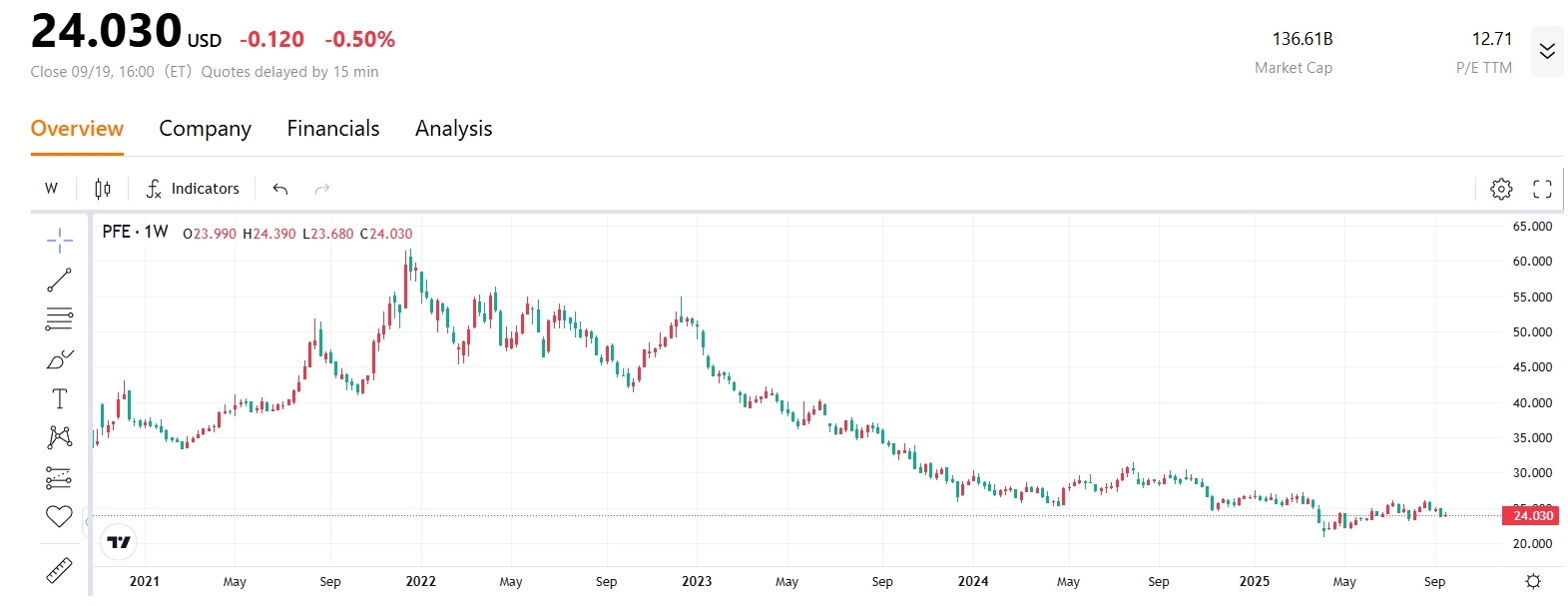Pfizer Bets Big with 110% Premium to Acquire Metsera — A Lifeline in the Weight-Loss Drug Race
TradingKey - Once propelled by booming demand for its COVID-19 vaccine, U.S. pharmaceutical giant Pfizer (PFE) has since struggled with pipeline stagnation and a prolonged stock slump. As Novo Nordisk and Eli Lilly dominate the weight-loss drug market — building empires from scratch — and after Pfizer’s own R&D setbacks, the company is now going all-in with a doubled-premium acquisition of rising obesity drug developer Metsera.
According to the Financial Times, citing people familiar with the matter, Pfizer is nearing a $7.3 billion deal to acquire Metsera (MTSR) — Pfizer’s largest acquisition in nearly two years. Its last major deal was the $43 billion purchase of cancer drug developer Seagen in 2023.
Under the proposed terms, Pfizer will pay $47.50 per share in cash for Metsera, with an additional $22.50 per share contingent on achieving certain performance milestones — bringing the total valuation of the company to $7.3 billion.
This offer significantly exceeds Metsera’s closing price of $33.32 on Friday, September 19, representing a 110% premium — underscoring Pfizer’s urgency and determination to secure a seat at the table in the “weight-loss revolution.”
Pfizer’s stock has halved from its pandemic peak of $51.13, trading at $24.03. After the “post-COVID slump,” CEO Albert Bourla has been actively seeking new growth avenues — and the obesity market is one of the most attractive.

Pfizer Stock Price Chart, Source: TradingKey
In April, Pfizer halted development of its oral GLP-1 weight-loss drug Danuglipron due to liver toxicity risks. However, analysts from BMO and William Blair had predicted that Pfizer would likely enter the space via acquisition.
The Financial Times noted that this latest move marks Pfizer’s bold attempt to break into the lucrative obesity market after failing in clinical trials this year.
Sources said the acquisition could be officially announced as early as this Monday, barring any last-minute complications.
Founded in 2022, Metsera went public on the Nasdaq in late January 2025, quickly becoming one of the most watched IPOs in the global weight-loss sector, with shares surging 47% on debut. Since bottoming out in late April, Metsera’s stock has rebounded over 130%.
Pfizer’s acquisition of Metsera could reshape the competitive landscape of the fast-growing obesity market. Unlike the dominant GLP-1 therapies used by Lilly and Novo, Metsera’s “next-generation” drugs aim to deliver strong weight loss with less frequent dosing and milder side effects.
Metsera’s lead candidate, MET-097i, achieved an 11.3% weight reduction in patients after 12 weeks in a recent Phase II trial, with potential for monthly dosing instead of weekly. Another drug, MET-233i, helped patients lose 8.4% of body weight in 36 days in early trials, with fewer gastrointestinal side effects — such as nausea and vomiting — than traditional GLP-1 drugs, and also administered on a monthly basis.
Bloomberg analysts said MET-233i could have best-in-class potential in obesity treatment. Its long half-life may allow for once-monthly dosing, creating a key differentiator against rivals.
According to TradingKey, the Wall Street consensus target price for Pfizer is $29.13, implying 21.22% upside from current levels.



